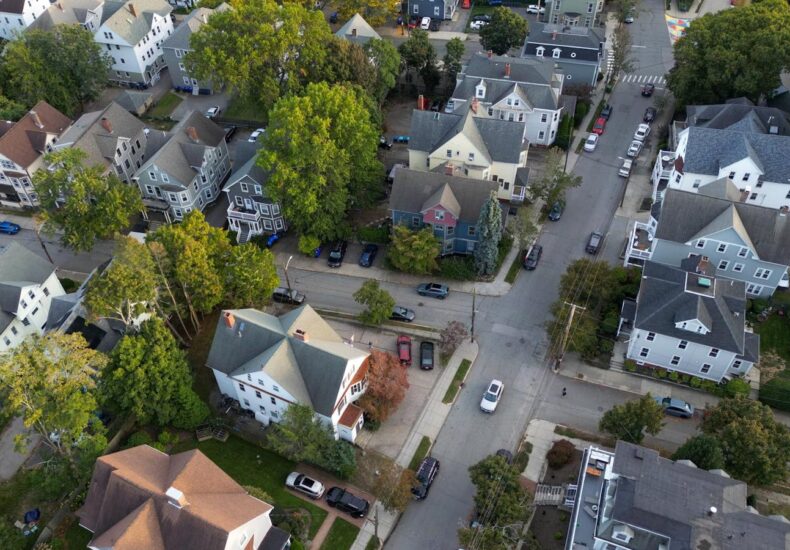Tag: cost-burdened
Median RI renter is unable to affordably rent in any Ocean State city, new report finds
For the first time ever, Rhode Island renters earning the state’s median income are unable to affordably rent in every city and town in the state, according to a new report from HousingWorks RI, a local housing research organization. Since 2005, the group has released a fact book every year examining how Rhode Island’s housing landscape is impacting statewide economic outcomes. This year’s report found that Rhode Island’s rental prices are increasing at rate faster than that of any other New England state. Since 2018, the state’s home sales prices have increased 65%, while rental prices have grown by 60%. Wages, on the other hand, have only gone up 29%. Additionally, one in three Rhode Island households are cost-burdened, meaning that they spend more than one-third of their income on housing, according to the report. Rhode Island is “very dependent on the federal government for housing resources,” said HousingWorks RI Executive Director Brenda Clement in an interview with The Herald. Clement added that around 80% of the state’s housing expenditures come from the federal government. She added that shifting federal policies may jeopardize Rhode Islanders’ ability to afford housing. If realized, the federal government’s efforts to limit the Supplemental Nutrition Assistance Program and Medicaid would have a “really serious impact on people trying to not only attain housing, but (also) maintain their existing housing,” Clement said. “If they lose other assistance programs, then things become dicey very quickly.”The report also found racial disparities in the extent to which housing issues impacted Rhode Islanders. Almost 40% of Hispanic homeowners and 35% of Black homeowners are cost-burdened, compared to only 24% of white homeowners and 19% of Asian homeowners. Rents are high in the Ocean State because the demand for housing exceeds the supply, House Speaker Joseph Shekarchi (D-Warwick) wrote in an email to The Herald, adding that Rhode Island has been ranked last in the country for new housing construction for several years. This housing crisis has only worsened over time, according to Eric Hirsch, a sociology professor at Providence College and the director of the Rhode Island Homeless Advocacy Project.”Things have gotten demonstrably worse due to the Great Recession of 2008 and the COVID-19 pandemic,” Hirsch wrote in an email to The Herald. “Those in the lowest income categories are facing unprecedented levels of homelessness if they can’t find a permanent doubled up situation with friends or family.”According to the report, the number of people experiencing homelessness decreased 3% from 2024 to 2025. But the 2025 Point-in-Time Count, which measures the amount of people experiencing homelessness in a single night in January, found a “36% increase in the number of unsheltered chronically homeless Rhode Islanders,” the report reads. Crossroads Rhode Island, an organization focused on addressing homelessness, has also seen an increase in demand for their housing resources.”We served nearly 5, 600 people last year, an unprecedented number in our 130-year history,” wrote Michelle Wilcox, the president and CEO of Crossroads, in an email to The Herald. Despite these potentially discouraging numbers, Clement said localities like Providence have managed to make some big gains in housing affordability. Compared to other cities in Rhode Island, Providence “understands the challenges around affordability and housing . a little bit better,” she said. “They’ve got a little bit more capacity for planning and for managing these projects and approving these projects.”Last year, Rhode Islanders voted to approve a $120 million housing bond to fund the construction and redevelopment of housing. In the next few months, $39 million of this funding will be released to “support homeownership initiatives, public development and efforts to accelerate housing production across the state,” wrote Emily Marshall, spokesperson for the Rhode Island Executive Office of Housing, in an email to The Herald. But even this bond, Hirsch wrote, “is not going to put much of a dent in the affordability crisis.”Instead, he believes Rhode Islanders need a larger state-driven commitment “to building subsidized project-based housing with project-based subsidies, accepting the public opinion for housing development and passing rent stabilization legislation proposed by the Providence City Council,” Hirsch wrote. Gov. Emphasizing the importance of addressing the housing crisis, Shekarchi wrote that “all positive outcomes start with a good, safe place to live.”.
 The New York Times
The New York Times
- Epstein Files Reveal Efforts to Build Ties With Russian Officials, Including Putin 2026 年 2 月 10 日 Steven Lee Myers and Nataliya Vasilyeva
- How the Israeli President’s Visit to Australia Created a ‘Tinder Box’ 2026 年 2 月 10 日 Victoria Kim
- A.I. Personalizes the Internet but Takes Away Control 2026 年 2 月 10 日 Brian X. Chen
- Mamdani Hires Groundbreaking Computer Scientist as Chief Tech Officer 2026 年 2 月 10 日 Jeffery C. Mays
- Pride Flag Is Removed From Stonewall Monument After Trump Directive 2026 年 2 月 10 日 Liam Stack, Jonathan Wolfe and Yan Zhuang
- Epstein Used Cash to Wield His Influence at Columbia and N.Y.U. 2026 年 2 月 10 日 Sharon Otterman
- Susan Collins Runs for Re-election, in One of 2026’s Top Senate Fights 2026 年 2 月 10 日 Reid J. Epstein
- Hamas Would Keep Some Weapons Initially in Draft Gaza Plan 2026 年 2 月 10 日 Adam Rasgon, Natan Odenheimer and Abu Bakr Bashir
- The Ties That Bound the UK’s ‘Prince of Darkness’ Peter Mandelson to Jeffrey Epstein 2026 年 2 月 10 日 Michael D. Shear and Jane Bradley
- NLRB Dismisses Case Brought by Fired SpaceX Employees 2026 年 2 月 10 日 Noam Scheiber and Ryan Mac
